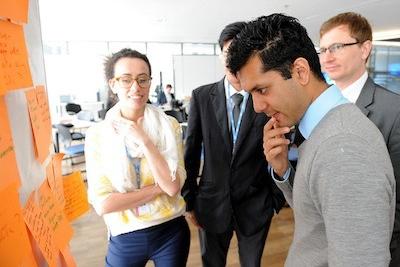
By Shannon Houde
In many ways, millennials are the hope of the 21st Century -- and they've got a lot to teach us about social innovation. But to get them on board, business has to speak their language
"The youth of today" -- it's a typically derisory comment that anyone under the age of 30 will have undoubtedly heard from older people in their circle. Addicted to social media, valuing job satisfaction over job security, prizing individuality above conformity ... "The youth of today" wouldn't know real work if it jumped out of their tablet screen. But there's another way of looking at the millennial generation, and business leaders run the risk of losing out by not paying attention to them.
A fascinating report from my previous-employer, Deloitte, surveyed 7,800 members of the millennial generation across 26 countries, and the results were summed up as 'big demands and high expectations.' Millennials will comprise 75 percent of the global workforce by 2025, and the findings show that they want to work for organizations that make a positive contribution to society by addressing global challenges of resource scarcity, climate change and income equality. They also want to work for companies that support innovation, and identified the biggest barriers to innovation as management attitude, operational structures and procedures, and employee skills, attitudes and diversity. What's more, the report states that they are "ready to work independently if their needs are not being met by a traditional organization," implying an entrepreneurial spirit and attraction to alternative working structures.
This means big things for the impact and sustainability sectors. A young global generation -- connected culturally and spatially through technology, motivated by social good and seeking careers that facilitate innovation -- is exactly the kind of leadership business must harness if it is to adapt to the triple bottom line of economic, social and natural capital in coming decades.
So how do they do it? Well, if current findings are anything to go by, the answer is: badly. Another Deloitte survey -- this time looking at global human capital trends -- found that 66 percent of CEOs surveyed believe they are “weak” in their ability to develop millennial leaders, while only 5 percent rate themselves as “excellent." As Katie Fehrenbacher points out in a recent blog post: "Companies that are good at recruiting young talent talk about creating a 'mission-driven' culture. Google has known this for years and it’s only one reason why it tackles projects like putting $1 billion into clean power farms across the U.S. ... Social good is cool." More companies need to follow in Google’s mission-driven footsteps if they're to meet the challenge of attracting, retaining and developing young talent. In an interview with Inc.com, Deloitte's Josh Bersin sets out three useful strategies to help millennials see the opportunities in a company:
- They want face time, so devising leadership programs that let them spend time with senior leadership can help convince millennials that they could eventually rise to that level too.
- They want to jump around and explore new opportunities far more quickly than past generations, so map out vertical and horizontal career paths within your company clearly if you want to hold on to them.
- They need a different type of manager, one that focuses on graduating employees into better positions rather than hoarding talent, and giving them the opportunity to grow.
One of the most interesting observations around millennial talent acquisition came from a Stanford Graduate School of Business study that found that 90 percent of MBAs were willing to eschew financial gain in order to work for a company with a strong commitment to social good. This reinforces the idea that, with sufficient innovation, effective management and leadership development, impact organizations don't need the big bucks to attract the cream of today's talent - they need sustainability credentials.
According to an article on Forbes, corporations are seeing potential employees from top universities asking specifically about volunteering and community service, indicating that it is one of the criteria for an “employer of choice." As the authors put it, "companies that don’t consider magnifying their community footprint will be held accountable by future potential employees."
For today's business world, the key message is that Generation Innovation will lead the way on aligning social and environmental impact with financial performance. The key response is to put strategies in place now to ensure that they're doing it for your company, not the competitor’s.
If you’d like some practical advice and tools for incentivizing innovation and finding top young talent, contact me.
Image credit: itupictures, via Flickr/ CC BY
Shannon Houde is founder of Walk of Life Consulting, the first international career coaching business focused solely on the environmental, sustainability and corporate responsibility fields.
TriplePundit has published articles from over 1000 contributors. If you'd like to be a guest author, please get in touch!














